Mapping of PPP-related ISDS cases
1. Methodology
The Investment policy hub offers a PPP-specific quantitative analysis of known, treaty-based ISDS cases, focusing on economic sectors of relevance for the SDGs.
The analysis is based on 767 known, treaty-based ISDS cases (as of the end of 2016) contained in UNCTAD’s Investment Dispute Settlement Navigator. As some proceedings (or certain aspects of proceedings) remain confidential, the information contained in the Navigator is not exhaustive. Moreover, ISDS cases based on domestic investment legislation or investor-State contracts are not included in this database and are therefore excluded from the present analysis (for ICSID cases based on domestic investment legislation or investor-State contracts see ICSID’s case database, https://icsid.worldbank.org/en/Pages/cases/AdvancedSearch.aspx).
Methodology:
- ISDS cases were mapped according to whether they fulfilled the working definition of PPPs ( see here).
- Often, it is not the local company that is bringing the claim, but one of its (direct or indirect) shareholders who by virtue of the shareholding (or loans) has contributed to the financing of the project. In our analysis, these claims also qualify as PPP-related, so long as the underlying project qualifies as PPP.
- For some cases, it is difficult to verify whether the PPP criteria are fulfilled, particularly in pending cases or where decisions or awards have not been made public.
- The following analysis does not claim to be exhaustive, but instead aims to give an overall picture.
- We welcome any additional information or clarifications on specific cases to help improve the present analysis. Please contact us through the contact form.
2. Economic sectors analyzed
In accordance with their relevance for the SDGs and in conformity with the classifications used in the Navigator, the mapping focuses on ISDS cases in the following economic sectors: Electricity (sub-sectors: “electricity, gas, steam and air conditioning supply”)
- Water and sanitation (sub-sectors: “water collection, treatment and supply”; “sewerage”; “waste collection, treatment and disposal activities; materials recovery”; and “remediation activities and other waste management activities”)
- Transportation (sub-sectors: “land transport and transport via pipelines”; “water transport”; “air transport”; “warehousing and support activities for transportation”; and “postal and courier activities”)
- Construction (sub-sectors: “construction of buildings”; “civil engineering”; and “specialized construction activities”)
- Human health and social work activities (sub-sector: “Human health activities”)
3. Findings
Key findings:
Electricity is the most common economic sector in terms of number of known ISDS cases (154) and share of PPPs giving rise to ISDS claims (90%); followed by water and sanitation (36 known ISDS cases, 80% PPP-related); construction (69 ISDS cases, 30% PPP-related); transportation (37 known ISDS cases, 60% PPP-related); and health (see figure II.1).
Figure II.1: PPP-related ISDS cases per SDG sector
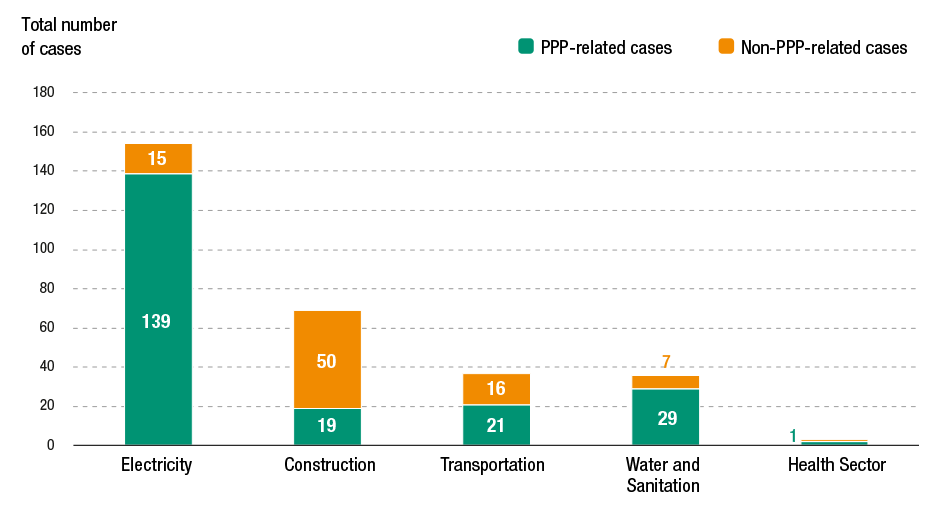
Source: © UNCTAD, ISDS Navigator, based on 767 known, treaty-based ISDS cases.
Note: Cases may be mapped twice if they involve two sectors (e.g. many of the power generation/renewable energy protection projects include the construction of the power generation facility).
a. Electricity
Most ISDS cases in the electricity sector arise from PPP projects: of 154 known treaty-based cases mapped in the ISDS Navigator, 139 cases (90%) are PPP-related while the remaining 15 cases (10%) are not (see figure II.2). Some of the mapped cases overlap with cases mapped under the heading of “construction” as many of the power generation/renewable energy protection projects include the construction of the power generation facility.
Figure II.2: Share of PPP-related ISDS cases in the electricity sector (based on 154 cases
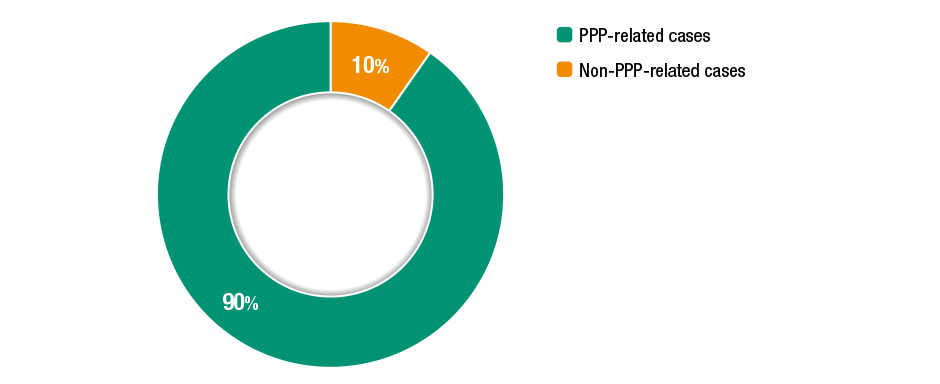
Source: © UNCTAD, ISDS Navigator, based on 767 known, treaty-based ISDS cases
- Electricity is particularly relevant for PPPs and PPP-related ISDS claims. The few cases not qualifying as PPP-related are mostly claims arising out of privatization contracts.
- Of particular relevance are the renewable energy cases (investments in solar, wind, and hydropower electricity generation).
- The provision of energy is an essential public service and the generation of renewable energy is an increasingly important priority in light of climate change and the SDGs (Target 7 – Ensure access to affordable, reliable, sustainable and modern energy for all).
- The renewable energy sector typically depends on large, upfront investments, recouped over long periods of time.
- The private sector normally has both the financial capacity and technical expertise for such investments, but needs an investment-encouraging and stable regulatory framework.
- To provide investors with incentives and legal security (stable regulatory regime), many countries have been enacting special incentive or support schemes (such as feed-in tariffs or other subsidies) and usually enter into power purchase agreements with the investor to make projected revenues more predictable.
- Some countries (such as Spain, Italy and the Czech Republic) had to scale back their incentive schemes as a consequence of the global and European financial crisis.
- With some foreign investors affected by the scaling-back, these countries have been hard-hit with ISDS claims and they make up a substantive share of the (pending or concluded) ISDS cases. For more detail see UNCTAD’s ISDS Navigator.
- Most of the current ISDS cases concerning renewable energy have been brought under the Energy Charter Treaty (ECT).
- See here for more detail on the background of the renewable energy cases in Spain and Italy.
b. Construction
- Often, ISDS cases in the construction sector are not PPP-related: this is for example the case for “pure” construction projects (turnkey) where the long-term dimension and/or significant financial risk assumed by the investor may be lacking; or in the case of construction for purely commercial purposes (e.g. private real estate projects, such as construction of hotels, shopping centres, etc.).
- Cases that are PPP-related typically concern the construction of gas or power generation facilities or public infrastructure (roads, bridges, railways, airports).
- Of 69 known, treaty-based cases mapped in the ISDS Navigator, only 19 (28%) are PPP-related, while 50 (72%) are not PPP-related (see figure II.3)
Figure II.3: Share of PPP-related ISDS cases in the construction sector (based on 69 ISDS cases
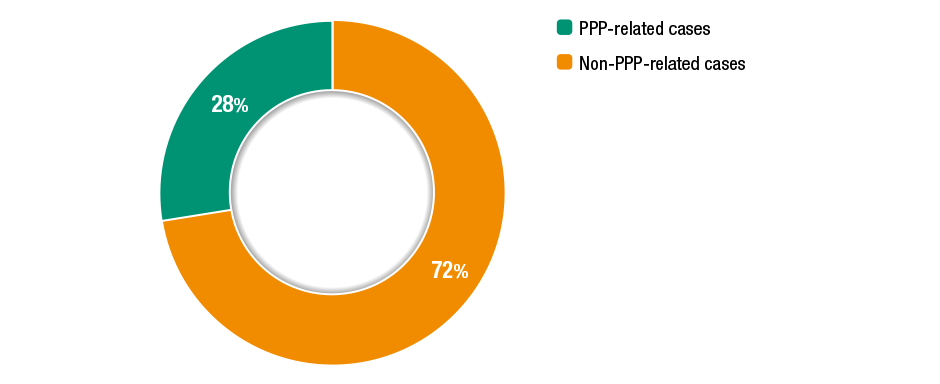
Source: © UNCTAD, ISDS Navigator, based on 767 known, treaty-based ISDS cases.
c. Transportation
- ISDS cases in this economic sector concern the construction and operation of pipelines, construction, operation and/or maintenance of airports, railways and ports infrastructure.
- Of 37 known, treaty-based cases mapped in the ISDS Navigator, 16 cases (43%) are not PPP-related while 21 cases (57%) are PPP-related (see figure II.4).
Figure II.4: Share of PPP-related ISDS cases in the transportation sector (based on 37 ISDS cases
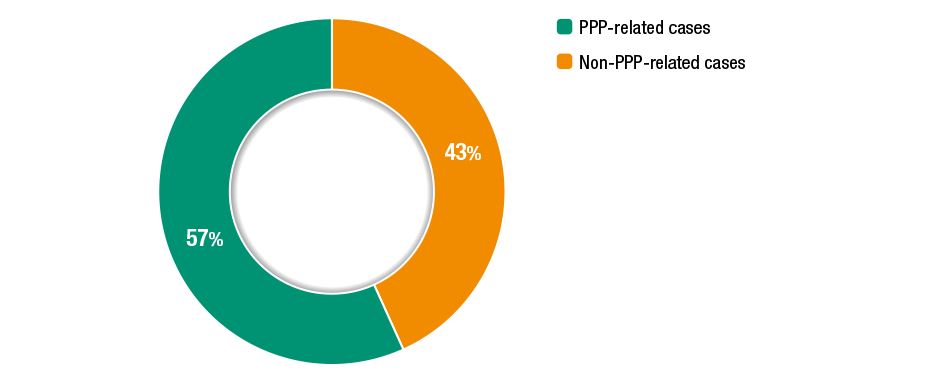
Source: © UNCTAD, ISDS Navigator, based on 767 known, treaty-based ISDS cases.
d. Water and sanitation
- PPP cases in this sector concern waste management services (waste collection, treatment and/or incineration), the building and operation of hydroelectric power plants and water supply and distribution services.
- Of 36 known, treaty-based cases mapped in the ISDS Navigator, seven are not PPP-related while 29 (80%) are PPP-related (see figure II.5).
Figure II.5: Share of PPP-related ISDS cases in the water and sanitation sector (based on 36 ISDS cases
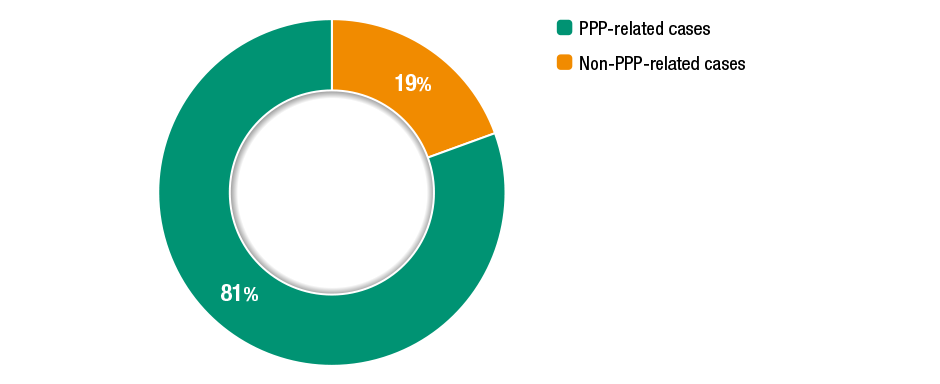
Source: © UNCTAD, ISDS Navigator, based on 767 known, treaty-based ISDS cases.
e. Health
- Only few ISDS cases have been brought so far in this sector.
- Of three known, treaty-based cases mapped in the ISDS Navigator, two are PPP-related and one is not (see figure II.6).
Figure II.6: Share of PPP-related ISDS cases in the health sector (based on 3 ISDS cases
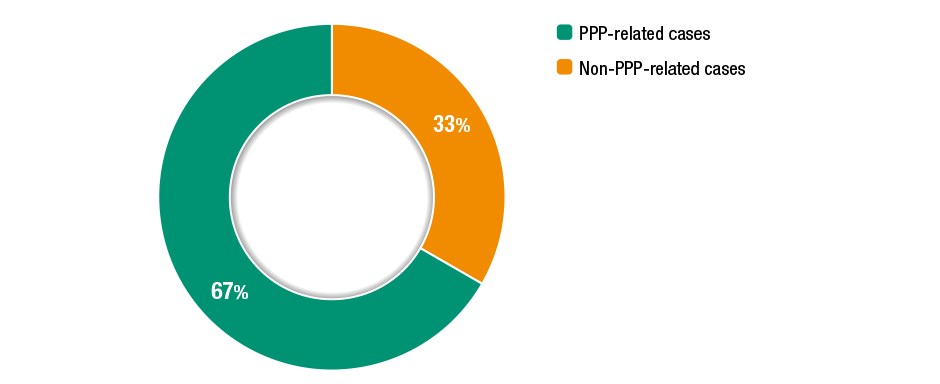
Source: © UNCTAD, ISDS Navigator, based on 767 known, treaty-based ISDS cases.















